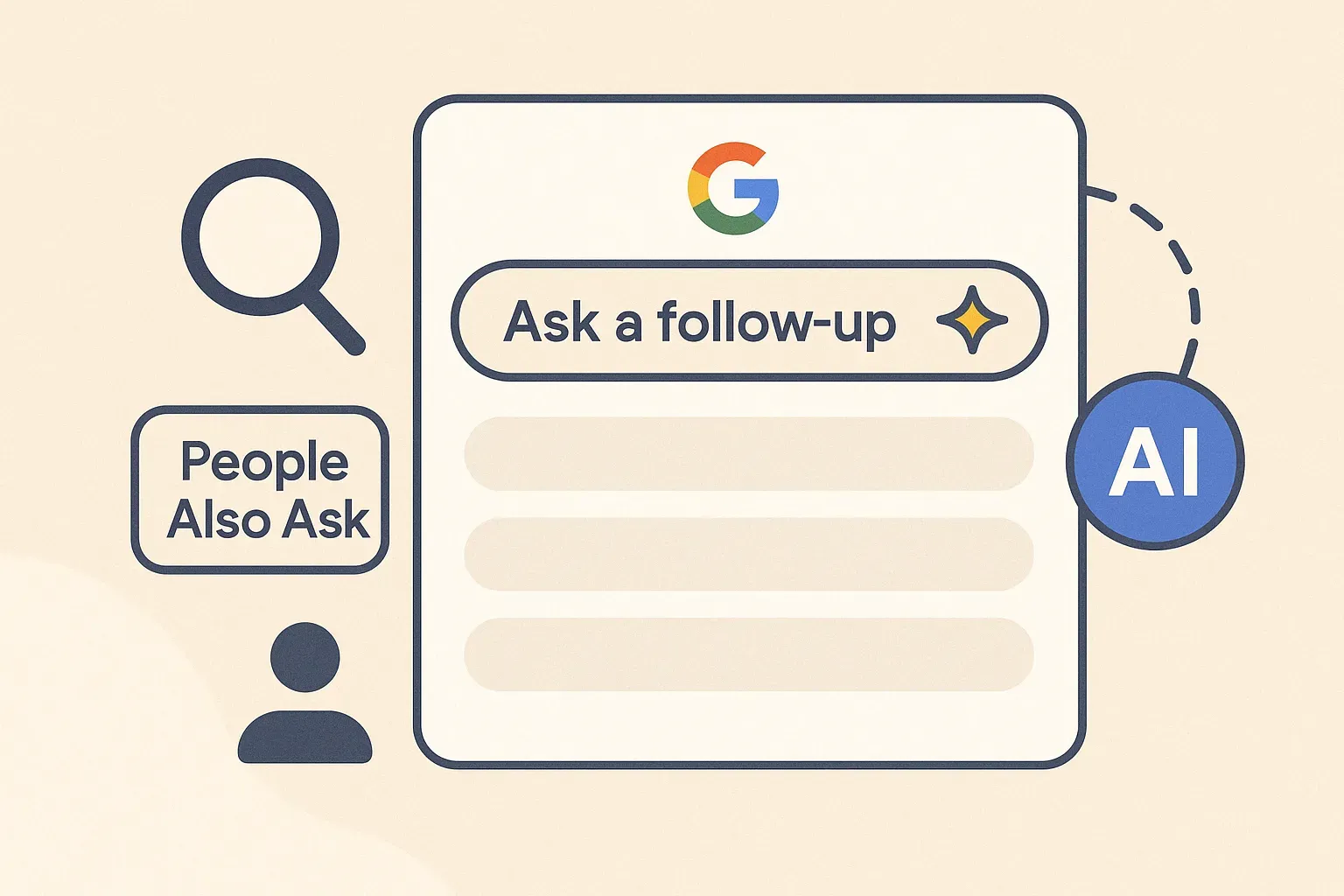Google’s 'Ask a follow-up' test shows up in Search—here’s why marketers should care
Google's testing a Gemini-style prompt that nudges users to ask more questions. Here’s how it compares to “People Also Ask”—and what it could mean for content.

It’s not an official update, but it’s definitely something to watch. Google is testing a new feature in its Search results that nudges users to “Ask a follow-up” after their initial query. The prompt comes with a little Gemini star icon next to it, signaling that AI is behind the scenes.
This experiment was spotted by X user Sachin Patel, who shared screenshots of the new interface. When clicked, the follow-up suggestions take you to a fresh set of search results—similar to clicking a related link or refining your question manually.
It’s not a full product rollout, and Google hasn’t said anything about it officially. But based on how often these experiments turn into permanent features, it’s worth paying attention—especially if you’re in SEO or content marketing.
Google is testing ask a follow-up in the SERP. When I click on one, it redirects to a new query in the search bar.@rustybrick@gaganghotra_ @brodieseo pic.twitter.com/oJhzbK2mSU
— Sachin Patel (@SachuPatel53124) April 11, 2025
Short on time?
Here’s what’s happening—fast:
- What’s new: Google is testing an “Ask a follow-up” prompt with Gemini icons in Search.
- Feels familiar: It’s like “People Also Ask,” but AI-generated.
- Why it matters: Follow-up queries could reshape how users search and click.
- Big picture: Signals a shift toward more conversational, AI-driven search.
What’s this new feature doing?
Here’s what we know from the screenshots: below the search results, users see a section labeled “Ask a follow-up” with a few suggested queries, all marked with a Gemini star. Clicking one leads you to a new search result page based on that follow-up question.
At a glance, it looks like a fresh coat of AI paint on a familiar idea. If you’ve seen the “People Also Ask” box before—and let’s be honest, you definitely have—this is pretty much that, but with a Gemini twist.
So far, this isn’t showing up for most users, and it may never go wide. But the way it’s designed tells us Google is still experimenting with how to keep people engaging with search longer—and using generative AI to do it.
Not new, just smarter?
For marketers who’ve been around the SEO block, this feels familiar. Google’s “People Also Ask” box has been doing a version of this for years: offering related questions, inviting deeper clicks, and helping users refine what they’re actually looking for.
The difference? This time, the follow-up prompts appear to be powered by Gemini—Google’s in-house AI. That likely means the suggestions aren’t just pre-written or pulled from past data. They might be dynamically generated based on the context of your original search.
Is that a game-changer? Not yet. But it’s a reminder that Google is leaning hard into AI to make search more interactive. And that shift could start to change how users navigate search—and how content gets discovered.
Why this test matters for marketers
Even if this never rolls out fully, it gives us a glimpse into where search might be heading. Here’s what to keep in mind:
1. Follow-up prompts = longer search journeys
If these prompts stick around, users might get used to clicking through chains of related questions. That could make SEO less about ranking for one keyword and more about showing up across a series of connected queries.
Marketers should start thinking about their content in clusters—not just answering one question, but anticipating the next two or three someone might ask.
2. Gemini branding could mean AI-driven rankings
The Gemini star isn’t just a design choice. It tells users (and content creators) that AI is powering what shows up next. If these follow-ups are being generated on the fly, that could shake up which content appears in those next clicks.
Content that’s clear, contextual, and useful across multiple layers of intent might perform better in these AI-assisted flows.
3. Another step toward chat-style search
This test isn’t as dramatic as a chatbot popping up—but it points in that direction. Google seems to be nudging people toward more conversational use of search, where one question leads to the next and next, like a back-and-forth.
For brands, that means preparing for content that doesn’t just answer a question once but fits into a larger conversation users might be having with the search engine.
Google’s “Ask a follow-up” feature might be a quiet test with no press release, but it still tells us something important: the way people search is changing. Follow-up prompts, Gemini badges, and more dynamic query suggestions all point toward a future where content has to do more than just rank—it has to carry the conversation forward.
Whether or not this experiment sticks, marketers should take it as a nudge. Start thinking beyond single keywords. Plan for follow-up questions. And keep an eye on how AI is influencing the search results your audience actually sees.
Source
Patel, S. [@sachupatel53124]. (2025, April 14). Google is testing a new 'Ask a follow-up' feature with Gemini stars in Search [Image attached]. X. https://x.com/sachupatel53124/status/1910550566494953892


